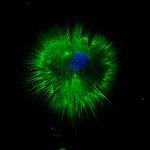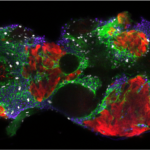Présentation
“Mechanisms of regeneration of the damaged liver”
Following injury the normal liver regenerates through hepatocyte proliferation. Following severe or prolonged liver injury hepatocyte or cholangiocyte regeneration can be impaired and senescence can occur. In human liver disease, when hepatocyte replication is impaired, ductular reactions proliferate and expand through the parenchyma. The regenerative potential of these ductular cells has been controversial. Most mouse models of liver injury do not inhibit hepatocyte replication effectively and ductular cells do not significantly regenerate hepatocytes. We have used several models to investigate the regenerative potential of ductular cells in mouse models of liver injury when hepatocyte proliferation is inhibited- a clinically relevant scenario.
Using a mouse model system to fate map ductular cells into hepatocyte we have found the differentiation of the ductular cells into hepatocytes which is dependent upon both liver injury and the inhibition of hepatocyte replication. The duct derived hepatocytes behave as “normal hepatocytes” rather than ducts.
We have also modelled biliary injury combined with inducible cell specific senescence and found that senescence can spread between adjacent cell types and inhibit both hepatocyte and biliary regeneration. The mechanisms behind this will be discussed as will potential therapies to target this spreading senescence. These systems model clinical liver disease where hepatocyte proliferation is impaired and will permit the analysis of mechanisms controlling ductular cell activation and differentiation.
Biography:
Stuart Forbes (SF) is Professor of Transplantation and Regenerative Medicine, at the University of Edinburgh. Stuart’s research focuses on how the chronically damaged liver regenerates and how these mechanisms process becomes deranged in liver and bile duct cancer (Group Website: http://www.crm.ed.ac.uk/research/group/liver-stem-cells-regeneration). In particular, SF’s research looks at how the epithelial cells in the liver (hepatocytes and biliary cells) interact with the inflammatory cells of the liver during injury and regeneration.
SF is Director of the MRC Centre for Regenerative Medicine, (http://www.crm.ed.ac.uk/) which houses 230+ scientists and clinicians. SF is Director of the UK wide UKRMP Hub for engineering and exploiting the stem cell niche (http://www.ukrmp.org.uk/hubs/niche/) which aims to exploit the biology of stem cell niches for translational benefit. SF is a consultant Hepatologist at the Scottish Liver Transplant Unit and has clinical interests in liver failure, cancer and liver transplantation.


